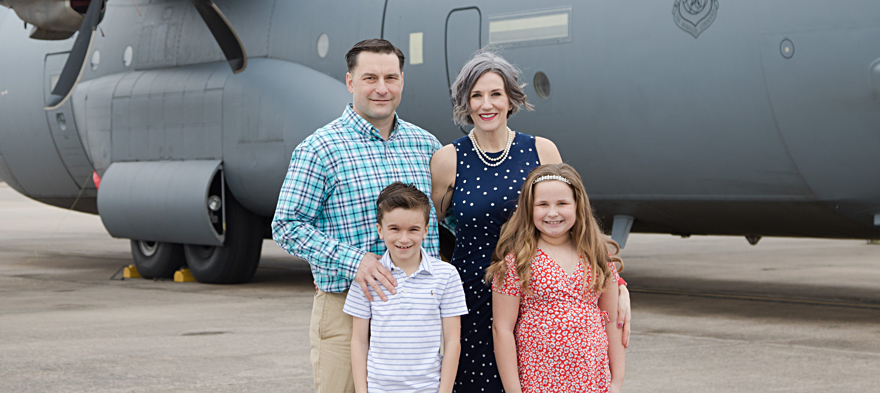
Apr 28, 2021 12:00:00 AM
by Jessica Saum
As an educator, I work in a Purple Heart school serving a high number of students from military families, most of whom are connected by at least one parent to Little Rock Air Force Base. I have taught these unique students in preschool through fourth grade as a military spouse myself, while raising two resilient military kids with my husband who is active duty Air Force. My children were both born in Germany, and while they bring diverse cultural experiences to their classrooms, moving and attending new schools does present challenges I never faced growing up.
Each year in April we celebrate the Month of the Military Child as a way to emphasize the important role military children play in the armed forces community. The Month of the Military Child is not only a time to applaud military families and their children for the daily sacrifices they make and the challenges they overcome, but is an opportunity to stress the importance of providing children with quality services and support to help them succeed in the transient military lifestyle.
[pullquote]Most military children will move between six and nine times before they graduate high school and not every school they will attend is prepared with the understanding of the challenges these students face.[/pullquote] Many military kids have traveled the globe with their parents building relationships in different states, countries and multiple continents. They have learned a multitude of hard lessons providing them with the strength to handle nearly anything thrown their way. Military children deal daily not only with these repeated moves, but also with deployments and some even with an injured parent as part of the life into which they were born.
As educators who serve military families, we must make a concerted effort to support an educational system that progressively builds the college and career readiness of these students. As educators serving these resilient students, we must aim to challenge them in ways that maximize their potential while helping them to excel academically, but also socially, emotionally and physically. [pullquote position="right"]It is our job as teachers to look for ways to help these students thrive.[/pullquote]
At any grade level, a priority should be placed on cultivating meaningful relationships between these students and school staff including classroom teachers and support members, in addition to guidance counselors and building administrators. We also need to have reasonable expectations and an understanding of their behaviors and attitudes towards education.
These students may arrive at any point in the year and will need clear expectations and guidelines for school and class procedures, as each school they have attended was likely run and organized differently. Military students truly may not know what to expect even as high school students if they attended most of their education in another state or even country.
Educators must also actively look for learning gaps and areas where a student excels as their previous duty location school most likely used a different curriculum or pacing and planning guide. Peer tutoring with either situation can give these students an opportunity to connect with their peers and begin to form important new friendships and relationships.
April should be used as an opportunity for schools to plan special events to honor military children. I challenge teachers and administrators to incorporate the themes of this month into their everyday school routines, duties and responsibilities. [pullquote]This year more than ever, many military children have had to face new learning from home on top of extended separations from a parent and delayed moves to a new home.[/pullquote] The strength and resiliency of military children is truly inspirational. While their experiences and stories are not always the ones found in a book, they are important ones to honor and to tell.
Jessica Saum is a native of Columbia, South Carolina, but calls Sherwood, Arkansas home. Currently, she is a self-contained special education teacher at Stagecoach Elementary School in Cabot, Arkansas teaching students in kindergarten through fourth grade. Jessica is a 2021 AAEF Advocacy Fellow and a 2022 Arkansas Teacher of the Year.
Few issues in education spark more tension and debate than standardized testing. Are they a tool for equity or a burden on students? A necessary check on school systems or a flawed measure of...
Charter schools are public schools with a purpose. Operating independently from traditional school districts, they're tuition-free, open to all students, and publicly funded—but with more flexibility...
Despite the benefits of a diverse teaching force, prospective teachers of color fall out of our leaky preparation pipeline at every stage: preparation, hiring, induction, and retention. Here’s what...
Ed Post is the flagship website platform of brightbeam, a 501(c3) network of education activists and influencers demanding a better education and a brighter future for every child.
© 2020-2025 brightbeam. All rights reserved.
Leave a Comment